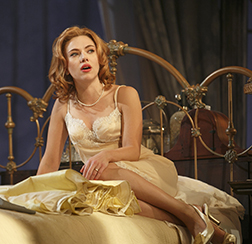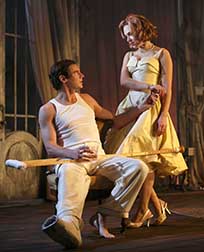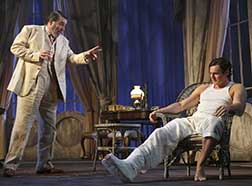By Lucy Komisar

Interesting how misogynistic this 1955 melodrama feels in 2013. In Tennessee Williams‘ view, the men are victims and the women are perpetrators. That fits into Williams‘ theme about Brick (Benjamin Walker), the former school football star, being a victim of homophobia.
Except, in a curious turnaround, the wound is self-inflicted when his wife Maggie (Scarlett Johansson), forces Brick and his college buddy to confront their relationship or maybe just their unspoken desires.
In some ways, the play is as much about class as gender. As the actors in this production, directed by Rob Ashford, play it, Brick is a bit of a wimp/nonentity and Maggie is one tough babe from a proud but impecunious family. She had a “debut” and knew the girls whose families had cash. Now, she is fighting to make sure she and Brick don’t get cut out of the family inheritance.
Johansson, by the way, is very good as the tough babe. She isn‘t a sultry sexpot, as the role has been played in the past.
The action takes place in the large bedroom Brick and Maggie are inhabiting on their visit to Brick‘s parents‘ estate in the Mississippi Delta. The room has a curlicued bedstead, double high ceiling and French doors onto the balcony. There‘s a cut-glass chandelier above and several old blue raffia chairs.

Struggle is the underlying mood. We are on a plantation run by Big Daddy (Ciar¡n Hinds), not quite as physically big as you expect him to be. A self-described redneck, he started as a lowly worker and built up the business, because he was in the right place at the right time and worked hard. Now, 65, he is dying of cancer. Except he doesn‘t know it, because he‘s been lied to.
His corporate lawyer son Gooper (Michael Park) has arrived with wife Mae (Emily Bergil) and five noisy kids with the idea of getting Big Daddy to sign a will insuring a responsible (to Gooper) handover of the family wealth. That includes 28,000 acres of good farmland.
But Big Daddy prefers Brick, for a reason one can‘t quite fathom, maybe because he‘s contrary. Brick, a one-time star athlete, has quit work as a local TV sports announcer. He is on crutches, having just broken his ankle jumping over a hurdle at his old high school athletic field at 3 am. Recapturing lost youth?
Walker plays Brick as amiable, with no personality, not much presence, no inner life, no torment. Johansson on the other hand seems about to explode. Her voice grates. Brick points out that she has become hard. But no wonder. In her silk beige slip, before dressing to join Big Daddy‘s birthday party, she tells the man who will no longer sleep with her, “You were a wonderful lover.” His indifference makes her feel like a cat on a hot tin roof who stays on it as long as it can. (Later she changes to a yellow strap dress and sling back heels.) The big bed in the middle of the stage becomes an ironic commentary. My sympathy is with Maggie.

In and out of the bedroom also marches Big Mama (Debra Monk). Unlike in other prominent productions, she is heavier than Big Daddy. She is a screamer, a brayer: “Do you make Brick happy in bed? You‘re childless. Brick drinks. When a marriage goes on the rocks, the rocks are there.” Brick, however, tells Maggie he‘d be relieved if she found a lover.
The big gay story – remember this was 1955 – is that Brick had an “attachment” to his football buddy Skipper. Maggie tells him that when she and their friend Gladys double-dated, “it was more like you and Skipper. You two had something that has to be kept on ice.”
When Brick and Skipper graduated from Ole Miss, they turned down good jobs to keep being football stars with the Dixie Stars. Maggie tells Brick, “I said, Skipper stop loving my husband.”
Flashback. During their Dixie Stars football days, Maggie seduces Skipper. He can‘t perform, which persuades him he is gay. He turns to booze, he dies. Brick turns to booze. So, here we are. It‘s never actually certain that the two had a homosexual relationship. But Williams makes the tragedy Maggie‘s fault for even raising the issue.

Brick tells his father he drinks because of disgust, “to kill my disgust.” He says, Skipper and me had a clean, true thing between us!”had a clean friendship, practically all our lives, till Maggie got the idea you’re talking about.“
Meanwhile, Big Daddy, full of fury, accuses his wife of wanting to take control of the estate on news of his illness. He cruelly excoriates her “fat body” and curses the hypocrisy of 40 years living with her. He wants “attractive women.” Not that he is George Clooney. But he is rich.
Maggie and Big Mama, alas, had no other choices in 1955 Mississippi than to attach their lives to these dreadful men! (My view, not Tennessee Williams‘.)
Mae (Emily Bergl) and Gooper are nonentities. Mae is good as an obnoxious lady who is sweet but can stick it to her targets.
Scarlett Johansson is excellent as Maggie. Benjamin Walker is not there enough as Brick. Ciar¡n Hinds‘s Big Daddy is not big enough. Debra Monk‘s Big Mama is too much a screamer. And Tennessee Williams is too fixed on his gay male agenda to understand the women in this play.
Cat on a Hot Tin Roof.” Written by Tennessee Williams; directed by Rob Ashford. Richard Rodgers Theatre, 226 West 46th Street, New York City. 877-250-2929. Opened Jan 17, 2013; closes Mar 30, 2013. 3/2/2013.


I never understood this play? There’s no one to root for. Maggie, find a new scratching post.